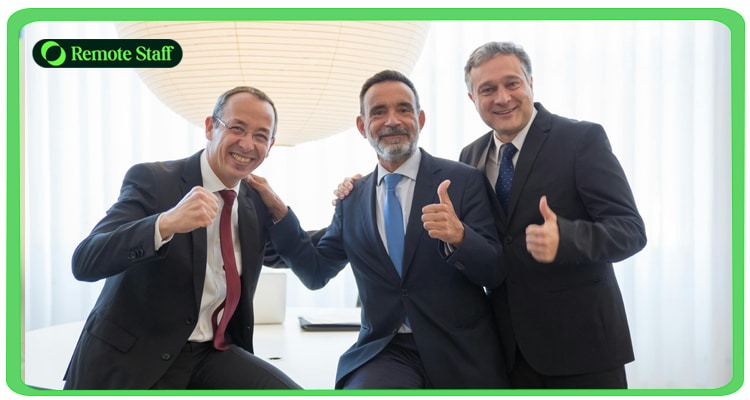Remote work has plenty of benefits, but many are still wary of the very real threat of getting exploited or scammed by employers.
Due to the nature of the industry, online jobs are largely unregulated by the Department of Labor and Employment (DOLE). Thus, most remote workers have little to no recourse if something goes wrong.
In other words, if your client constantly delays your salary, or worse, goes AWOL with your output, there’s nothing you can do.
Thus, if you want to thrive in an online work from home setup, it’s important to acquire, and retain the right sort of clients.

What is a Premium Client, and Why Are They a Critical Part of a Successful Remote Career?
Premium clients are your dream employers; they pay well, value your expertise, and seek a long-term working relationship.
Besides long-term financial stability, working under this type of client also boosts your portfolio and reputation, helping you attract other high-quality clients in the future.
Real-life Examples of Premium Clients
Here are some success stories of Filipino remote workers that managed to find premium remote clients abroad and thrived as a result:
Catherine’s Story:
Catherine’s remote work journey started in 2018 when she discovered Remote Staff.
Thanks to them, she was able to land a job as a marketing manager for an Australian-based mergers and acquisitions advisory firm -where she still works today.
Catherine loves her job because the CEO is very understanding and easy to work with.
As a result, she works on a flexible schedule, so she can still work on her career and take care of her family.
For more details about her story, click here.
Gerald’s Story:
Gerald discovered remote working when his wife had a miscarriage in 2017.
Not wanting to leave her at home as she recovered, his wife suggested he work from home via Remote Staff, where he found a job as Email support for a UK-based furniture store.
Today, Gerald still works in the same company as he loves being in a team where he feels respected, recognized, and valued.
For more details about his story, click here.
Common Issues When Working With Non-Premium Clients
One of the main downsides of working with non-premium clients is that they lowball their applicants or delay their salary. In some cases, they may even just take your work and go AWOL.
In addition, some of these clients provide contracts with vague roles and responsibilities, which allows them to pile tasks on you without due compensation.
However, the most significant downside of working with these clients is they offer no long-term stability, meaning you could be let go anytime, sometimes without warning.
Benefits of Working With Premium Clients
The most significant benefit of working with high-quality global clients is peace of mind. When you don’t need to worry about your paycheck coming in on time or getting terminated at a moment’s notice, you’re free to concentrate solely on doing a good job.
Additionally, their contracts provide a clear scope of your responsibilities so you know where you stand.
Incidentally, this also makes it easier to negotiate for a raise, especially if you have well-defined key performance indicators (KPIs) as well.
Finally, having them on your resume helps you attract similar clients in the future.

How and Where Do We Find Premium Clients?
Now that we’ve established the importance of finding high-quality remote clients abroad, let’s now focus on how to land and keep them:
Solving an Existing Problem
The best way to increase your chances of attracting remote clients abroad is by offering a specific solution to their needs.
This helps demonstrate your expertise and the value you can provide when hired.
Here are some common problems companies face today that you can work on building skills for:
Technology and Software Development
- Legacy System Modernization:
- Updating old systems involves dealing with compatibility issues and potential data security risks, so there’s a niche for relevant skills.
- Cybersecurity Vulnerabilities:
- Rising cyber threats require constant updates and skilled security professionals to monitor and educate users about them.
- Mobile App Development:
- Developing apps for various types of devices and platforms while ensuring top-notch user experience and security is a skill that’s always in demand.
- AI (Artificial Intelligence) and Machine Learning Integration:
- Implementing AI and machine learning in one’s company is expensive, data-intensive, and requires specialized talent.
- Additionally, companies must ensure compliance with regulations and ethical guidelines to avoid misuse.
Marketing and Advertising
- Social Media Strategy Development:
- Many companies need assistance with producing engaging content, platform selection, and accurately measuring ROI (Return on Investment).
- Content Marketing Campaigns:
- SEO Improvement:
- Constant algorithm changes, keyword competition, technical website requirements, and long lead times make effective search engine optimization (SEO) a complex and ongoing task.
- Branding and Graphic Design:
- Maintaining brand consistency and adapting to new trends are vital for standing out among competitors.
Finance and Accounting
- Bookkeeping Optimization:
- Maintaining accurate and timely financial records can be labor-intensive, especially for rapidly growing companies, so this is typically outsourced.
- Cost-saving Financial Models:
- Companies need experts to analyze spending patterns and assess potential risks to find areas where they can reduce costs without sacrificing quality and growth.
- Financial Forecasting and Tax Planning:
- Accurately forecasting a company’s revenues and expenses can be challenging due to market volatility, and is typically left to professionals.
- Aside from this, companies must also remain compliant with tax regulations while maximizing savings through tax planning, which requires expertise and regular updates.
HealthCare
- Patient Management Systems:
- Many healthcare providers need assistance ensuring their patient management systems remain accurate and compliant with all regulations and integrating legacy systems into modern ones.
- Telemedicine Development:
- Healthcare providers also need help with developing and maintaining telemedicine platforms and ensuring patient data remains confidential.
- Additionally, they also need an expert capable of understanding various regional telemedicine regulations to ensure legal compliance.
- Health Data Analysis:
- Seamlessly integrating data from multiple sources and ensuring their quality and confidentiality is difficult without specialized help.
- Furthermore, complex data often requires advanced tools and expertise to interpret accurately.
Education
- E-learning Platform Development:
- Educational institutions need help developing robust e-learning platforms as they require secure, scalable, and easily accessible systems.
- Educational Content Creation:
- Creating effective educational content catering to various learning styles, languages, and educational standards is highly resource-intensive and requires complex scalability and customization.
- Specialized Curriculum Design:
- Developing curricula tailored to specific fields, skills, or learning needs requires a certain level of expertise and adaptability.
Human Resources
- Recruitment Process Optimization:
- Many Companies need specialized assistance with streamlining their recruitment process to further attract top talent.
- Employee Training Programs:
- Creating training programs that are accessible, measurable, and aligned with organizational goals can be time and resource-intensive, so they’re best outsourced to an expert.
- Employee Engagement Strategies:
- Companies are always looking for experts skilled at improving employee engagement to boost workplace retention and morale.
- Performance Evaluation Systems:
- As more and more companies go remote, they’ll need someone capable of building fair and effective performance evaluation systems for an online work from home setup.

Niche and Service Specialization
After determining the common problems of your potential clients, your next step is to determine which niche to specialize in.
This allows you to refine your target market, sets you apart from generalist applicants, and enables competitive positioning.
It also attracts clients that offer a premium for specialized services like content writing, digital marketing, or graphic design.

Cultural Research
Since you’ll be working with global clients, it’s also important to know more about their work ethic, values, and communication styles.
Practicing cultural sensitivity helps you better understand your client’s expectations and establish a positive relationship with them.

Building a Professional Online Presence
After identifying your client’s needs, it’s time to establish your professional presence online to showcase your skills and improve client acquisition:
Website and Portfolio
One of the best ways to make an online footprint is by having your own website and attaching your portfolio.
Your personal website acts as a central hub where potential clients can learn about your skills, view relevant accomplishments, and read testimonials.
A well-made portfolio showcases the value you can bring to your clients, which helps build your credibility and demonstrate your commitment to your work.
LinkedIn and Social Proof
Aside from having your own website, another great place to find quality remote clients abroad is LinkedIn.
Besides highlighting your credentials, LinkedIn allows you to show social proof via features like endorsements, recommendations, and shared achievements.
Other ways you can showcase social proof is via social media metrics (high follower count, shares, likes, or comments) on other social media platforms and by displaying awards, certifications, or affiliations with reputable organizations on your profile.
All these display your proven track record to potential clients, thus increasing the chances of potentially landing at least one of them.
SEO and Content Marketing
When it comes to building your professional presence online, familiarity with Search Engine Optimization (SEO) is a significant advantage.
SEO involves optimizing your website, portfolio, and LinkedIn profile with relevant keywords so that they appear closer to the top of the results.
For instance, if you’re applying for a virtual assistant job, your profile and website must have the keywords “virtual assistant” and “administrative support.”
Aside from SEO, another way to boost your visibility and attract premium remote clients abroad is through content marketing.
This means creating and publishing valuable content like blog posts, articles, or industry insights to showcase your expertise and demonstrate how you would address your clients’ needs.
Consistently producing informative and relevant content helps you build engagement and trust with your online prospects.

Networking and Outreach for International Clients
Aside from having a professional presence online, another way to boost your client acquisition is through networking and outreach.
Doing these helps you find potential remote clients abroad, gain new insights into your industry, and build meaningful relationships with industry peers.
Here are some networking and outreach tips to help you get started:
Online Networking Events and Webinars
A great way to start expanding your network is by attending online networking events and webinars.
These events give you direct access to various industry professionals, potential clients, and valuable learning opportunities.
But how do you stand out during these events?
For starters, start by learning more about the speakers and the event’s main focus.
During the event, actively participate by asking insightful questions and sharing valuable comments. Focus on building meaningful connections with potential clients by discussing their current challenges and goals.
Instead of pitching your services directly, offer actionable advice or solutions relevant to their concerns.
After the event or webinar, follow up within 24-48 hours with a personalized message to help you make a lasting impression on them.
Cold Outreach With Personalization
Cold outreach involves proactively reaching out to people or companies (usually through emails or social media messages) to pitch your services.
First time doing cold outreach? Here’s a step-by-step guide to making one that feels genuine and engaging:
- Research Your Target Clients:
- Before reaching out, always read up on your potential client by visiting their website or reviewing their social media profiles first.
- Note any specific challenges or areas where your skills could add value.
- Craft a Personalized Message:
- Craft a tailored message addressing their specific needs.
- You can start with a genuine compliment about their services/products or recent achievements, then highlight how you can help them take things further.
- Mention relevant previous projects or skills to emphasize the value you offer.
- End With a Call-to-Action:
- Close your message with a clear call-to-action, like inviting them to schedule a quick call or asking where you can send more information, such as a more detailed pitch.
- Keep It Short and Professional:
- Stick with a concise, professional message; briefly explain who you are, what you offer, and how it will benefit them.
- Follow Up Thoughtfully:
- If they don’t respond after 1-2 weeks, send a polite follow-up message stating that you’re still interested in working with them and briefly restate the value you can provide.

Best Places to Find Quality Clients
Still struggling with finding remote clients abroad?
Here are some of the best places to look for them:
Professional Remote Work Agencies (i.e. Remote Staff)
One of the best ways to find premium remote clients abroad is through a trusted outsourcing company, like Remote Staff.
We vet our clients to keep you safe from scams and have measures in place in case they go AWOL.
Besides helping you find the right client, we’ll also help you maintain a lasting working relationship with them.
For starters, we provide a reliable monitoring system to promote trust, accountability, and transparency between you and your client.
We’ll also help you and your client address any remote or cultural challenges you may encounter.
Finally, we draft and enforce contracts specifically designed to protect you from clients who suddenly disappear or go MIA.
LinkedIn and Social Networks
Social networking sites like Facebook and LinkedIn are another great option.
LinkedIn, in particular, is ideal for people seeking business connections, partnerships, and freelance contracts. It also has features for displaying social proof, helping you build your credibility.
Furthermore, these platforms have search and filter functions and built-in lead generation tools to help you find clients who need your particular services.

Retaining Premium Remote Clients
Getting premium clients is one thing. Keeping them is another.
Let’s now discuss how you can improve your client retention:

Establish Clear Communication and Boundaries
A good working relationship starts with good communication patterns and setting boundaries with your client.
Doing so reduces the risk of miscommunication, promotes trust, and empowers you to keep providing what your client needs so they’re less likely to look elsewhere.
Time Zone Management
Let’s start with navigating the time zone differences between you and your client.
Proper time zone management helps you work around your client’s business hours, ensuring prompt responses.
Additionally, displaying flexibility to adjust to your client’s time zone shows commitment, which makes clients feel prioritized and valued.
Project Management Tools
Using project management tools like Trello, ClickUp, and Monday.com helps you remain organized by breaking down projects into manageable tasks with clear timelines.
This helps prevent things from falling through the cracks and provides your client with a clear timeline of your progress, promoting transparency and trust.
Professional Communication Standards
Here are some useful guidelines to keep your client interactions clear, respectful, and efficient:
- Keep Messages Clear and Concise:
- Avoid unnecessary jargon or overly wordy explanations.
- Keep conversations focused on relevant and actionable points.
- Respond promptly:
- Respond within a reasonable and agreed-upon timeframe, especially with clients in different time zones.
- Always Use Respectful Language:
- When in doubt, err on the side of courtesy, especially when untangling misunderstandings or addressing feedback.
- Provide Regular Updates:
- Keep your client in the loop with regular, structured updates on your progress.
- Communicate via Appropriate Communication Channels:
- Use your client’s preferred communication channels (e.g. email, messaging apps, project management tools, etc.) to ensure visibility.
- Practice Confidentiality and Discretion:
- Always handle sensitive information with care and abide by the terms of your confidentiality agreements.

Showcase Reliability and Commitment to Long-Term Partnerships
Every relationship is a two-way street.
If you want to retain your best clients, you must consistently show reliability and commitment at work.
Here’s how you can do so:
Provide High-Quality Work and Meet Deadlines
The simplest way to display reliability and commitment is by consistently delivering quality work on time.
Here’s how:
- Plan and Prioritize Tasks:
- Upon receiving a new task or project, break it down into smaller, more manageable tasks.
- Identify the high-priority ones and prioritize them.
- Use project management tools to help you keep track of tasks and their deadlines.
- Set Realistic Timelines:
- Estimate the time needed to complete a task and communicate with your client if any adjustments are necessary.
- Minimize Distractions:
- Create a dedicated workspace at home and notify your family about your work hours to avoid distractions.
- Double-Check for Quality:
- Always double-check for accuracy, clarity, and completeness.
- This streamlines quality control and minimizes delays due to revisions.
- Communicate Proactively:
- Regularly update your client about your progress and notify them if you encounter any challenges that might affect your timeline.
Proactive Problem Solving
Another thing that separates ordinary employees from great ones is a strong initiative.
By identifying potential issues and addressing them immediately, you’re demonstrating your dependability and dedication to your client’s success.
Here are some tips to help you be more proactive at work:
- Conduct a Risk Assessment:
- Before starting a project, take time to identify areas where issues could arise (i.e. tight deadlines, complex tasks, or dependencies on other people).
- Develop Contingency Plans:
- For each potential risk, come up with solutions or alternative approaches so you’re prepared for any eventuality.
- Regularly Monitor Your Progress:
- Keep track of your project milestones and deadlines to get ahead of small issues and resolve them quickly.
- Notify Your Team of Potential Issues Early On:
- Let your client or team members know if you foresee a possible issue and explain your plan for solving it.
- Be Adaptable and Resourceful:
- A flexible approach allows you to adapt as needed and quickly find solutions if unexpected issues arise.
- Review and Learn from Past Experiences:
- After each project, evaluate any issues that came up and how you overcame them.
- Use these experiences to refine your problem-solving skills and approach to future projects.
Regular Performance Reviews
Regular performance reviews help you evaluate your current performance and identify areas to improve on.
Setting aside time for these allows you to foster open communication and address any concerns early with your client, promoting a stronger and more lasting working relationship.

Handle Contracts and Payment Professionally
Another secret to retaining premium remote clients abroad is having good contracts and payment processing in place:
Clear Contracts and Terms
Let’s start with the basics: setting clear contracts and terms between you and your client.
This establishes key details like the scope of your responsibilities, deadlines, deliverables, and payment schedule.
It also prevents misunderstandings, sets realistic expectations, and provides a point of reference if any issues arise.
Currency and Payment Processing
Next, it’s crucial to discuss your payment process with remote clients abroad.
This includes specifying what currency you’ll be paid in, choosing a reliable payment processor, who will cover the payment processing fees, setting a payment schedule, and providing invoice details.
If you don’t want to deal with these by yourself, you can work with a trusted outsourcing company like Remote Staff.
You’ll receive full compensation as the company won’t deduct any fees or commissions, and it’s always based on the number of work hours you’ve clocked in.
Automated Invoicing
Some remote workers also use automated invoicing software to ensure they’re paid properly and on time.
Some automated invoicing programs have a feature that automatically notifies your client of any overdue payments.
This also generates a record of your transactions, helping you manage your finances and resolve any disputes more easily.

FAQs
Here are some of the most commonly-asked questions about looking for premium remote clients:
How Can I Maintain Cultural Sensitivity When Working With Clients From Different Countries?
Here are some tips to help keep your working relationship with remote clients abroad smoother:
- Research Your Client’s Culture:
- Start by familiarizing yourself with the cultural norms, communication styles, and business etiquette of your client’s country.
- This helps prevent misunderstandings and demonstrates respect for their culture.
- Adapt Communication Styles:
- Different cultures have varying levels of formality, directness, and non-verbal cues in a business environment.
- Pay attention to those of your client’s so you can adjust your tone and language accordingly.
- Take Extra Care With Your Language:
- Always use clear, straightforward language and avoid slang or idiomatic expressions to avoid misunderstandings.
- Be Mindful of Time Zone Differences:
- Schedule meetings within working hours during your client’s time zone and avoid sending them urgent messages beyond these.
How Do I Request Time Off With International Clients Who May Observe Different Holidays?
It helps to follow these steps:
- Plan and Communicate in Advance:
- Notify your clients at least two weeks ahead of any planned time off so they can make the necessary arrangements as needed.
- Familiarize Yourself With The Holidays in Your Client’s Home Country:
- Look up the holidays in your client’s home country and avoid requesting time off during peak times or critical projects.
- Present Possible Solutions:
- If your absence could impact your team’s overall workflow, suggest solutions like completing your tasks ahead of time or delegating to another member of the team in advance.
- Be Flexible:
- Be prepared to adjust to your client’s preferences for certain critical periods or projects.
Are There Specific Ways to Protect My Intellectual Property When Working Remotely With Clients Abroad?
Yes, here’s how:
- Put Clear IP Clauses in Your Contracts:
- Your contract should indicate ownership of the intellectual property rights to the work you create, including any limitations on how it may be used.
- However, do bear in mind that any creations while under contract typically become the client’s property in most cases.
- Consider Non-Disclosure Agreements (NDAs):
- An NDA can protect your ideas, methods, and sensitive information from being shared or used by clients without your permission.
- Maintain Records of Your Work:
- Keep records of all your drafts, versions, and communications related to the work you’ve created as proof of originality and authorship.
- Watermark Drafts and Previews:
- Use watermarks or other identifiers when sending preliminary versions or samples of your work to protect your designs or content – especially if you haven’t been fully compensated yet.
Finding and retaining premium remote clients abroad is crucial for your long-term success in an online work from home setup.
However, if you’re just starting your online career, this can be a daunting task.
Fortunately, by following the tips above, you can improve your chances of acquiring -and keeping- high-quality clients.
Are you looking for an outsourcing company to help you start your WFH career? Remote Staff is here to help.
Our jobs list contains plenty of positions to choose from.
These range from online transcription jobs to online writing jobs and online design jobs.
So, what are you waiting for? Sign up here. Good luck!

